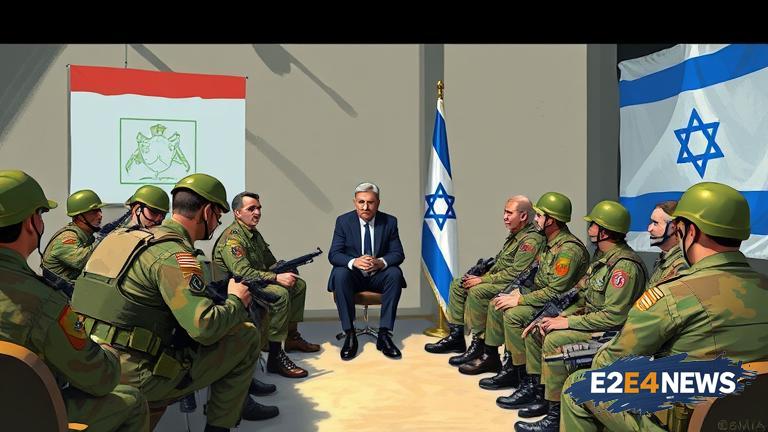The Israeli government has announced plans to brief the army on a potential war plan for the Gaza Strip, as tensions in the region continue to escalate. According to reports, the Israeli Prime Minister has outlined a comprehensive strategy for a possible conflict, citing security concerns and regional instability as key factors. The move comes amid growing tensions between Israel and Palestinian militant groups in Gaza, with both sides exchanging threats and warnings in recent weeks. The Israeli military has been on high alert, with troops and equipment deployed along the Gaza border in preparation for a potential outbreak of violence. The Prime Minister’s decision to brief the army on a war plan has been seen as a significant escalation of the situation, with many analysts warning of the potential for a large-scale conflict. The Israeli government has long been concerned about the security situation in Gaza, where militant groups such as Hamas and Islamic Jihad have been known to launch rockets and other attacks against Israeli targets. In recent months, there have been numerous reports of ceasefire violations and other incidents, leading to a significant increase in tensions between the two sides. The Israeli military has responded to these incidents with airstrikes and other measures, but the situation remains volatile. The briefing of the army on a war plan is seen as a key step in preparing for a potential conflict, with the Israeli government seeking to ensure that its military is fully prepared for any eventuality. The plan is believed to include a range of options, from limited military action to a full-scale invasion of the Gaza Strip. The Israeli government has not commented publicly on the details of the plan, but it is believed to be focused on targeting militant groups and infrastructure in Gaza. The move has been met with concern from the international community, with many governments and organizations warning of the potential for a humanitarian crisis in the event of a large-scale conflict. The United Nations and other organizations have called for restraint and calm, urging both sides to avoid actions that could escalate the situation. Despite these warnings, the situation remains highly volatile, with many analysts warning of the potential for a significant outbreak of violence in the coming days and weeks. The Israeli government has faced criticism for its handling of the situation, with some accusing it of taking a heavy-handed approach to the conflict. However, the government has defended its actions, citing the need to protect Israeli citizens and maintain security in the region. The situation in Gaza is complex and multifaceted, with a range of factors contributing to the tensions and instability. The Israeli blockade of the Gaza Strip, which has been in place for many years, has had a significant impact on the local economy and living standards. The blockade has limited the flow of goods and people into and out of the territory, leading to widespread poverty and unemployment. The situation has been further complicated by the presence of militant groups, which have been known to launch attacks against Israeli targets. The Israeli government has taken a firm stance against these groups, but its actions have been criticized by many as disproportionate and excessive. As the situation continues to unfold, it remains to be seen how events will play out. The international community is watching with concern, urging both sides to avoid actions that could escalate the situation. The Israeli government has a responsibility to protect its citizens, but it must also be mindful of the potential consequences of its actions. The situation in Gaza is a complex and challenging one, requiring a nuanced and multifaceted approach. The Israeli government must work to address the underlying causes of the conflict, including the blockade and the presence of militant groups. It must also be prepared to take a flexible and adaptive approach, responding to changing circumstances and seeking to minimize the risk of violence and instability. The coming days and weeks will be critical in determining the course of events, with the potential for a significant outbreak of violence or a more peaceful resolution. The international community will be watching closely, urging both sides to seek a peaceful and lasting solution to the conflict. The situation is highly volatile, with many factors contributing to the tensions and instability. The Israeli government must be careful and cautious in its approach, seeking to avoid actions that could escalate the situation. The briefing of the army on a war plan is a significant development, but it is only one part of a larger and more complex situation. The Israeli government must be prepared to adapt and respond to changing circumstances, seeking to minimize the risk of violence and instability. The situation in Gaza is a challenging and complex one, requiring a nuanced and multifaceted approach. The Israeli government must work to address the underlying causes of the conflict, including the blockade and the presence of militant groups. It must also be prepared to take a flexible and adaptive approach, responding to changing circumstances and seeking to minimize the risk of violence and instability.





